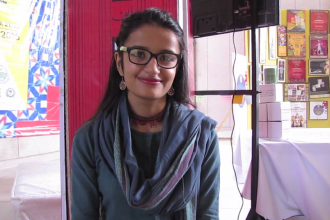He was so caught up in talking to Ahmed that it took him a while to understood why Iran felt so strange, despite its topographic similarity to Afghanistan.
‘No war,’ he said near sunset to Ahmed, when he finally understood.
Ahmed nodded, for once forbearing from jokes. He didn’t need to ask what this statement was doing in the middle of a conversation about poisonous snakes in Dasht-e-Margo – the Desert of Death – which Raza had travelled across in the pick-up truck without knowing its name.
They stopped for the night in a hotel where Raza amazed Ahmed with his command of Farsi, and set off again the next morning. They’d hardly gone any distance when a car drew up alongside them filled with women wearing head-scarves and dark glasses, calling to Raza’s mind all those Hollywood actresses of the 50’s who Harry had loved. For a few seconds the car and pick-up travelled alongside, Ahmed shouting out questions to the women, which Raza translated with a disarming smile: Which of you will marry me, which will marry my friend? Why are you travelling by road, don’t angels fly?, the women shouting back in response, ‘We don’t want husbands who smell of cabbages. Women are superior to angels, why are you insulting us!’, all the while looking at Raza. All too soon they turned off the road with waves and air-kisses, leaving Ahmed to clutch his heart while Raza mumbled, ‘I think I love Iran.’
But the closer they drew to the coast, the quieter Ahmed became.
‘Why don’t you just stay here,’ he said, by the time they were close enough to the docks to smell the sea air. ‘If you’re running from the Americans, Iran is a good place to be. You even speak the language. And the women are beautiful – and Shia, like you Hazara.’
He didn’t understand quite what it was that made Ahmed worry so much until nearly an hour after he’d embraced the nomad goodbye and promised that in happier times he’d return and together they would traverse Asia in a pick-up without cabbages. Then the ship’s captain into whose charge Ahmed had delivered him took him to a wooden boat with a tiny motor, and when Raza asked if there was any place in particular he should sit the captain pointed to the wooden planks underfoot and said, ‘Beneath there.’
Raza laughed, but the captain didn’t join in.
‘Have you pissed?’ he said.
‘What?’
‘Go on. Over the side of the boat. You’re not coming out until Muscat. And there’s no room for your bag down there.’
Raza clutched his knapsack. ‘There are holy artefacts in here. I swore to my mother – ‘
The captain made a dismissive gesture. ‘Just hurry up.’ While Raza emptied his bladder into the sea, the captain pulled up a section of the floorboards. Raza could hear voices beneath. How many people were down there?’
Many. Too many. Raza looked into the bowels of the ship and all he saw were prone men looking up at him, more than one crying out – in Farsi and in Pashto – ‘Not another one. There’s no room.’
‘Go on.’ The captain pushed at his shoulder blades. ‘Get in. We’re late already because of you.’
Raza peered down. There was no space between one body and the next, the men laid out like something familiar, but what? What did they remind him of? Something that made him back up, into the ship captain who cursed and pushed him forward, into the hold, onto the bodies which groaned in pain, pushed him this way and that until somehow, he didn’t know how, he was squeezed into the tiny space between one man and the next and his voice was part of the sigh – of hopelessness, of resignation – that rippled through the hold. It was only when the captain slammed down the hatch, extinguishing all light, that he knew what the line of bodies made him think of – the mass grave in Kosovo.




